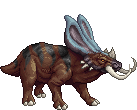Viewing reN3W

Father: Unknown
Unknown Pedigree
Hardiness: 30
Appearance: 8
Emerged: 5:50 06.03.2023
Matured: 9:13 08.03.2023
With its bony crest and leathery hide, the Kvieta Kiraso is built for defense from horn to tail. However, despite their general aversion to conflict, extreme caution must be exercised when approaching these herbivores; if threatened, they have been known to trample and even impale those who provoke them. Always on the lookout for ambushes from their megafaunal predators, Kvieta Kirasos will sharpen their horns and tusks on nearby rocks as they graze. Their main diet consists of grass, but they will also nibble on bushes and trees. These gargantuan mammals travel in matriarchal herds consisting of five to ten cows and their calves. In contrast, bulls are territorial creatures who only join the herd during the breeding season, when they fight for mates and put on dominance displays with their flashy crests and body markings. Occasionally, an especially aggressive cow—often with an abnormally pronounced set of horns and back spines—will show a marked disinterest in calf-rearing, instead leaving her young with the group and leading the solitary lifestyle typical of a bull.
The creatures that dwell in this rather desolate world still display some diversity in appearance, eating habits, and social behavior. Whether they have fur or feathers, skin or scales, their unique genetic makeup allows for a variety of colors and markings within each species. Despite limitations in food sources, herbivores, omnivores, and carnivores are all present in the food chain, and each species requires specialized care within a laboratory. Although the artificial setting of housing units and breeding pods precludes most opportunities to study true interspecific behavior, the interactions within and between species has been studied extensively in the wilderness by scientists daring enough to venture beyond the outpost’s walls.
